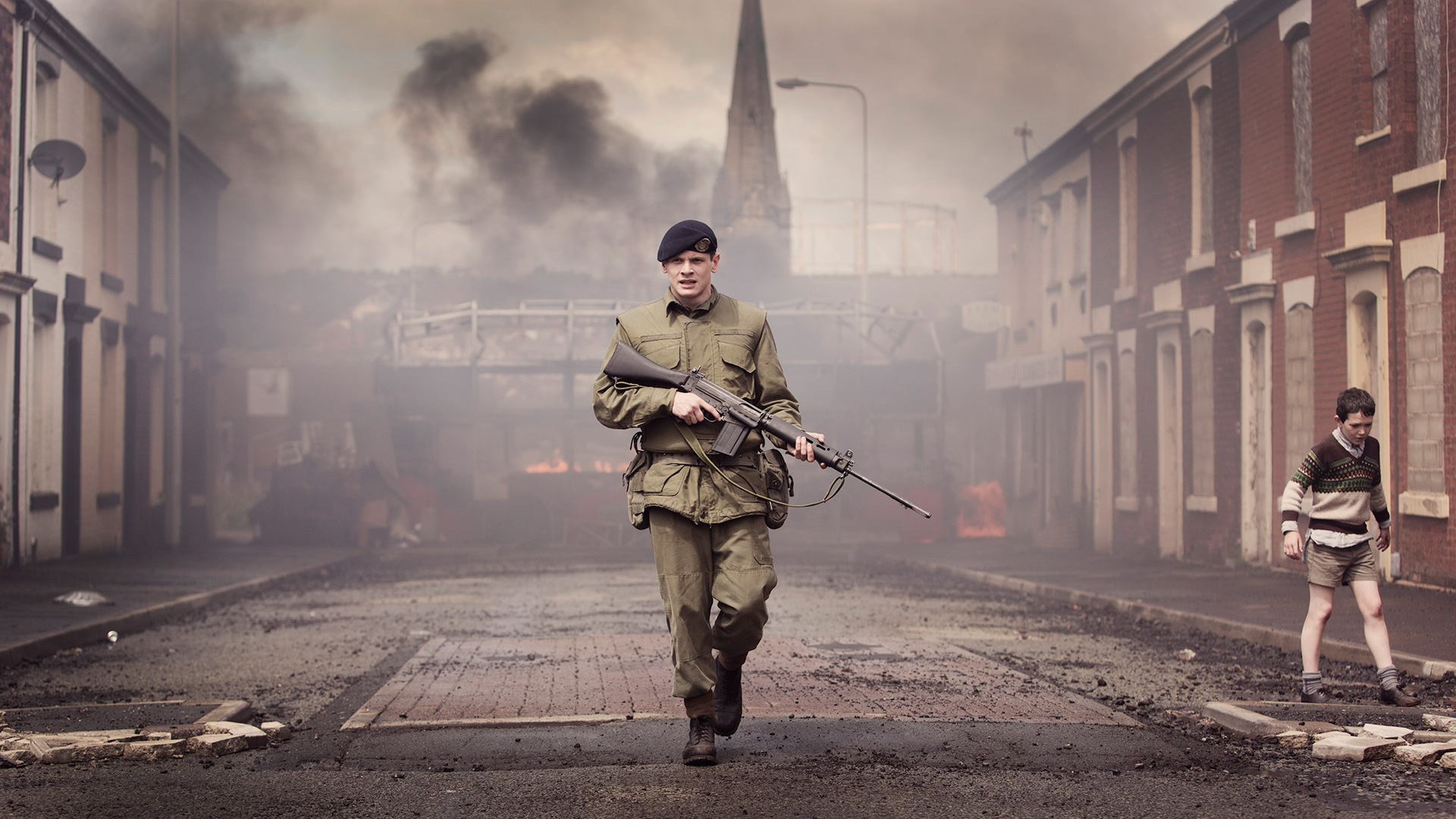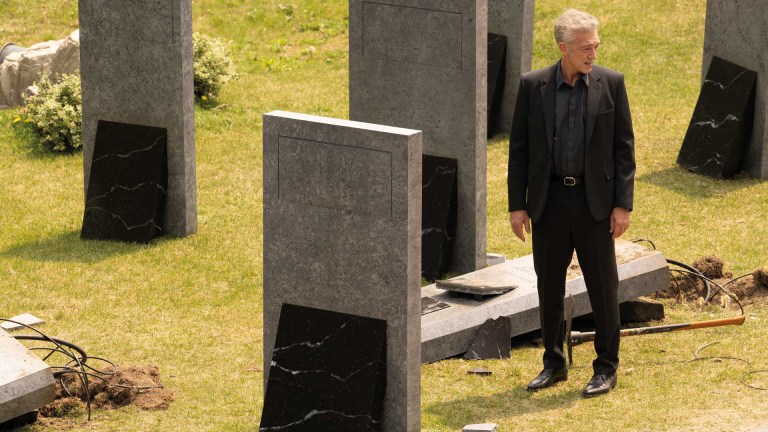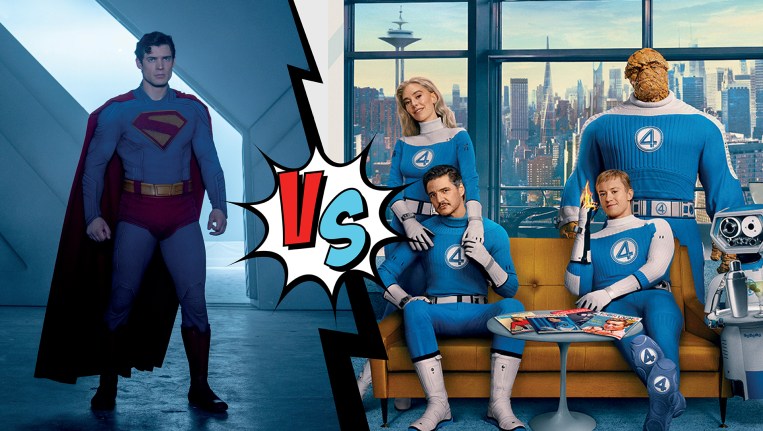O’Connell’s first film, Shane Meadows’ brilliant and brutal This is England, was followed by a couple of years popping pills and pretty girls in Channel 4’s Skins. Increasingly bigger roles in bigger films followed and it was last year’s stark prison drama Starred Up that really made critics stand up and take notice.
His performance as a naïve but nasty young offender was compared by The New Yorker to James Dean and Marlon Brando, The Hollywood Reporter remarked upon his “James Cagney-like bantam cock vitality and quicksilver mood changes”; Mark Kermode spotted “a hint of the young Malcolm McDowell”.
Why does O’Connell, 24, think critics see that indefinable quality of a golden age actor in him? “Cos I’m a gentleman, Steve. I mind my Ps and Qs. I respect people and call them by their necessary titles. I feel there’s a proper way of doing things. I’m not interested in being cool or modern or none of that, mate.”
Have you always been like that? “God no.”
The idea of a troubled youth emerges, through mentions of a criminal record and a car crash that severed his little finger. “Yeah it was just dangling off,” he says, unable to properly form his right hand into a fist. “Thankfully there was some skin attaching it together.”
Help came from an unlikely adviser. Hanging around backstage at a music festival five years ago, O’Connell bumped into Madchester icon Ian Brown and asked if he had any words of wisdom. The Stone Roses frontman chirpily replied: “Don’t be nervous, have a purpose.”
Advertising helps fund Big Issue’s mission to end poverty
“It’s interesting because that was an ethos I was struggling to get the better of anyway,” O’Connell recalls. “Very nervy times during that period of my life. As trivial as it was and perhaps almost cliché, it sticks with me today. Perhaps a tattoo opportunity one day…
“Look, if I really wanted to spiral out of control and get myself in a lot of mess then that would have been more available to me than any support. I was certainly more equipped with making my problem worse than I was with making it better.
“Thankfully I had my family. Without any of that then I really do worry. I got lucky. Shane Meadows came to where I learned drama to cast This is England. Without that I wouldn’t have been able to find my way through.”
Another important factor was that his father worked on the railways and O’Connell could travel for free to audition in London, though a lack of spare cash meant he sometimes slept rough. “I don’t want to plead any version of poverty with any of that,” he says, “but I went without accommodation a couple of nights in the city. That was more out of choice to save money than being forced to.”
It may have been a choice but did it give him an insight into what that life might be like? “For sure,” he nods. “It helped motivate me anyway.
“There was a time I considered joining the army to be the only plausible legitimate profession I could go in to. A last resort, that’s what it would have been for me. I was actively working towards it, I was a cadet – my criminal record would have stopped me from being able to enter the army properly so I had to get some good references from elsewhere. I was impressionable enough at that age to assume there was some honour in it.”
Advertising helps fund Big Issue’s mission to end poverty
O’Connell was able to draw upon that period of his life for ’71, in which he plays an inexperienced British soldier stranded in the wrong part of Belfast at the wrong point in history.
“Unfortunately a civil war is a universally relevant situation. God knows there’s plenty of them cracking off. I’ve got Irish heritage that I’m very proud of but whatever I knew about Northern Ireland, the conflict, the Troubles, my opinion on all of that was perhaps unhelpful because I was playing someone naïve to it. I studied four key stages of curriculum throughout my time at schooling – maybe even five.
“They tried educating us on Rome, Greece, both World Wars but not once in any of those history lessons did we ever touch on this war. I feel quite aggrieved that the system is manipulated to the point where it isn’t freely discussed or freely explored.
“You’re only fed the bits they’re comfortable with giving you. You notice it being swept under some version of a rug. Thankfully I’m in a line of work now where we can expose these truths.”
In the wake of the Scottish independence referendum and UK devolution, it seems the idea of Britishness is perhaps most important for actors hoping to break America, where Brits are the default choice for casting directors looking for heroes/villains or anyone with a bit of grit or gravitas.
“I’d never describe myself as a Brit,” O’Connell says. “I don’t claim any allegiance. First and foremost I’d say I’m from Derby. I see the advantages of having a more neutral accent, particularly when doing press.
Advertising helps fund Big Issue’s mission to end poverty
“When you go to America you’re repeating yourself that often you sort of have to develop a knack. For example I pronounce more Ts than I did before.”
As the spotlight grows, so will the glare from the media, which O’Connell has already been burned by. “Mmhmm” he sighs, perhaps recalling his relationship with Tulisa Contostavlos, which was punctuated by tabloid headlines.
“That is a by-product. It’s one I wish didn’t exist but it’s nothing I’m trying to court. One priceless lesson I learned off Angie and Brad was how they just don’t entertain anything that is said about them. Whatever it is, they won’t try and defend it, they just ignore it.
“And I think if it’s a case of that then I’m capable of that. It’s only real if I accept it as real. I’ve got a good idea of the things I need to avoid if I want to keep persevering.
“I feel a lot more confident concentrating on what’s next as opposed to what was. There’s very little I feel nervous about.”
Ian Brown would be proud.
Advertising helps fund Big Issue’s mission to end poverty
’71 is out now










